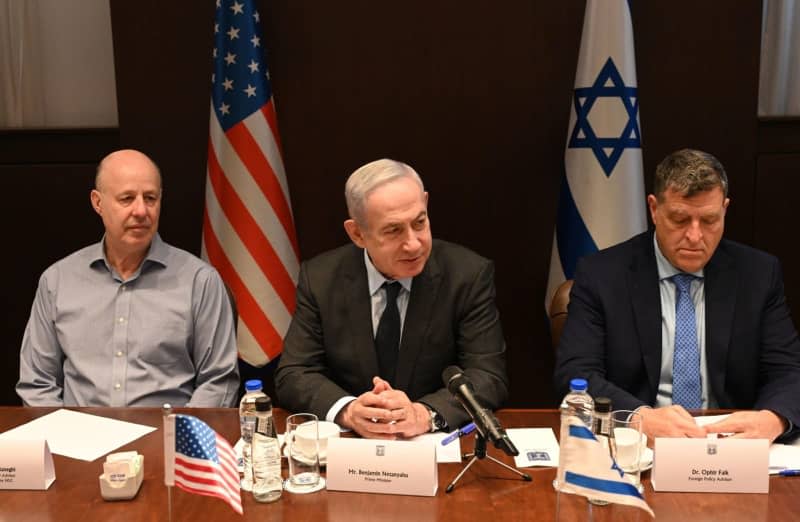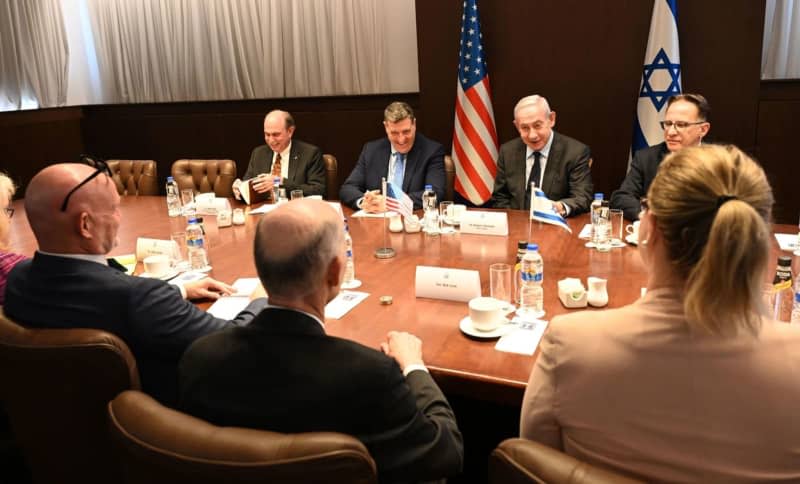Netanyahu: Cancelling delegation's visit to US was signal to Hamas

- Oops!Something went wrong.Please try again later.
Israeli Prime Minister Benjamin Netanyahu has justified cancelling a visit by a high-ranking Israeli delegation to the United States by saying it was intended to send a message to Hamas, the Palestinian militant group responsible for the massacres in Israel last year.
Netanyahu's office said on Wednesday that Hamas believed that international pressure - following a resolution by the UN Security Council calling for a ceasefire - would prevent Israel from destroying Hamas in the Gaza Strip.
Netanyahu said he wanted to let the Islamists know that they could not rely on this pressure having any effect on Israel. "I hope they have understood the message," he said.
In a resolution which is binding under international law, the UN Security Council called on Monday for an "immediate ceasefire" in the Gaza Strip, for the first time since the start of the war. The UN body also demanded the immediate and unconditional release of all hostages held by Hamas. The US waived its right of veto in the vote and abstained.
Netanyahu responded immediately by cancelling an Israeli delegation's visit to Washington. Observers interpreted the move as an angry reaction to the American abstention. "I thought the US decision in the Security Council was a very, very bad move," Netanyahu said on Wednesday.
Israel's military action in Gaza is increasingly straining relations with Washington and the US President, Joe Biden.
During the planned visit, high-ranking US government representatives had wanted to present the Israelis with alternatives to a ground offensive in the city of Rafah in the Gaza Strip.
Netanyahu has said a move into Rafah is essential to Israel's victory over Hamas.
Meanwhile the violence has continued in both the West Bank and on Israel's northern border with Lebanon.
Three people were killed in Israeli army operations overnight in Jenin in the West Bank, the Israeli army reported on Wednesday.
Israel's military said it conducted an anti-terrorist operation in the town on Tuesday night, during which Palestinians had thrown explosive devices. The soldiers responded with gunfire, killing one person. The 19-year-old who was killed was shot in the chest and thigh, the Palestinian Health Ministry in Ramallah said.
The Israel Defense Forces (IDF) also said it had attacked and killed two other armed Palestinians in Jenin. The Palestinian health authority reported that two people died in an Israeli drone attack in the refugee camp there.
To the north, at least nine people were killed late Wednesday in two Israeli strikes on southern Lebanon, Lebanese security sources and state media reported.
The Israeli army said it hit a terrorist cell located in a Hezbollah military compound in the area of Tayr Harfa, and an additional terrorist cell in the area of Naqoura.
The Lebanese state-run National News Agency (NNA) said three people were killed in an Israeli strikes near a cafe in the town of Naqoura. It said that six other people were killed in another strike on the village of Tayer Herfa.
Earlier at least seven people were killed in an Israeli airstrike in the Lebanese border town of Habariyeh.
Hezbollah announced in retaliation that its fighters fired dozens of rockets at the Israeli border town of Kiryat Shmona on Wednesday morning.
According to the Israeli rescue service Magen David Adom, a 25-year-old man was killed when a rocket hit a building in the town where he worked.
Since the beginning of the Gaza war after the massacre by the Palestinian Islamist Hamas movement in Israel on October 7, there have been repeated confrontations between Israel's army and militant groups such as Hezbollah in the Israeli-Lebanese border region.
The Iranian-backed militia, which also has close ties to Hamas, has reported more than 240 fighters killed since the Gaza war broke out.
Civilians have also been killed in both countries as a result of mutual shelling. Tens of thousands of residents have also left their home towns on both sides of the border. It is the worst escalation since the second Lebanon war in 2006.


